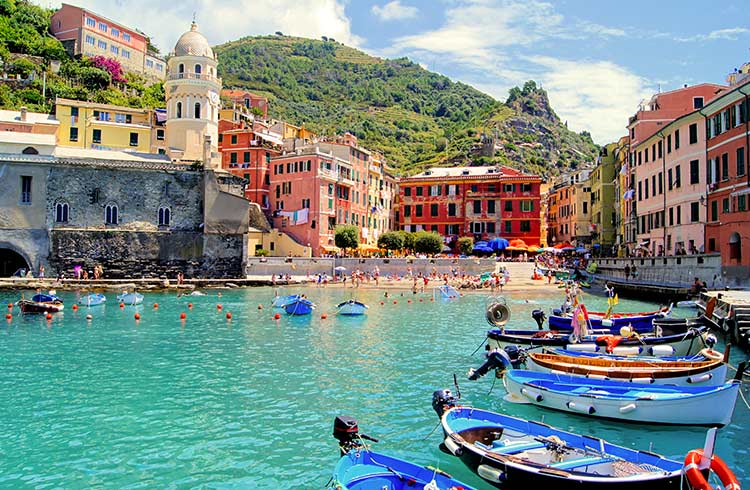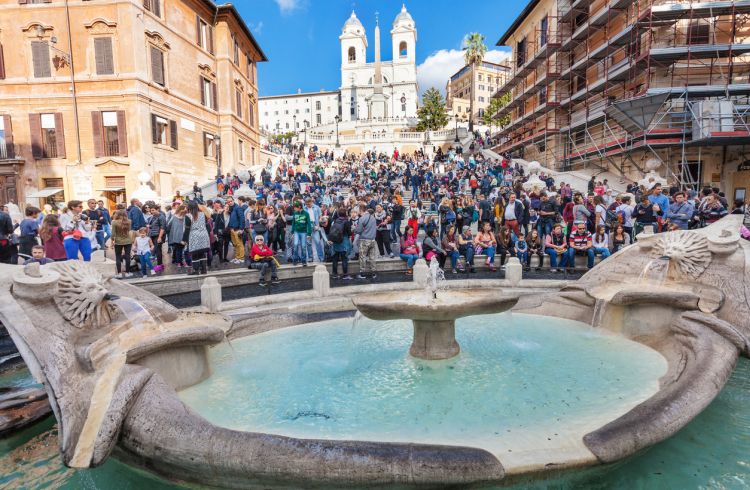With efficient public transport and a sunny climate, Italy is an easy country to visit. Here's what Italy is like, the best places to visit, and expert travel advice to make the most of your trip.
 Photo © iStock/jenifoto
Photo © iStock/jenifoto
Traveling to Italy? Here are six things to know before you go.
- There's no such thing as “Italian food”
- Cash vs. credit in Italy
- Train travel in Italy isn't always punctual
- Restaurant etiquette in Italy
- Explore Italy's alternative travel spots
- Remember to relax
There's no such thing as “Italian food”
We all know what to expect when we go to a typical Italian restaurant back home – the usual array of pasta dishes, maybe a couple pizzas, and, of course, a tiramisu on the dessert menu. Would it surprise you, then, to learn that in some parts of Italy you'll be hard-pressed to find tomatoes in the local dishes at all?
Italy is a relatively young country, formerly made up of independent city-states – now called regions – with which most residents of those regions still primarily identify. Each region has its own personality, its own dialect (sometimes its own language), and its own cuisine. Moving from region to region – and sometimes from town to town – introduces travelers to new local specialties, and it can be a shock to those of us who think we already know what Italian food is.
Get to know what's produced locally and what's in season, and you'll be eating the freshest and best of what that area has to offer. Steer clear of so-called “Italian food” that's not typical of the region you're in, and you stand a much better chance of avoiding touristy (and overpriced) restaurants.
Cash vs. credit in Italy
Most Italians pay for things on a day-to-day basis with cash – from their morning coffee to dinner that evening and everything in between. While businesses are now required to accept credit cards by law, as of November 2022 they are not required to accept plastic for purchases under €60, and many still prefer cash.
Be prepared to be refused electronic payments for small purchases, and also keep some cash on hand for taxis, buses, or outdoor food stands and markets.
And don't worry – almost every hotel in the country (and certainly all the big ones) takes plastic, as do train stations.
But watch out for the dynamic currency conversion fee. Shops or restaurants may ask if you would like to be charged in your home currency. Avoid this, since you'll likely be given an unfavorable exchange rate, plus be hit with fees from their bank as well as yours.
Train travel in Italy isn't always punctual
There's that great line about how “at least Mussolini made the trains run on time” – we've all heard it, and it's funny, but it's not true. It's an urban legend (one that some older Italians still repeat – don't try to argue with them).
Today, the trains in Italy are notorious for being a bit late, or for occasionally not running at all due to periodic labor strikes – and yet they remain, in my mind, the best way to get around most of the country. There are certainly places where you'll want to have a car, or where a bus might serve your needs better, but in most cases I still recommend trains as transportation – especially if you're sticking to bigger cities and towns.
I should note that while people will complain that trains are always late in Italy, that's not license to show up late for your train and then be annoyed when it's already left the station. In my experience, trains in Italy are more often on time than they are weirdly delayed.
Restaurant etiquette in Italy
This phenomenon isn't unique to Italy, but it bears mentioning because it catches so many off guard.
Where I live in the US, waiters come check on you 90 seconds after depositing a plate in front of you, wondering if “everything is okay” before you've had a chance to even take a bite. They'll check on you a few times during the meal, and then when it looks like you're close to being done, they'll leave your bill on the table for you to take care of at your convenience.
In Italy, after your meal is delivered, you may not see the waiter at your table again until it's time to clear your plates. And when you're done with your meal, after coffee or dessert or whatever your final course was, no one's going to come by with a bill without you specifically asking for it.
This is not the waiter being rude. This is the waiter letting you enjoy your meal and your dinner conversation for as long as you want. Restaurants in Italy are not looking to “turn over” tables every 1.5 hours – once you sit down, that's it, that's your table. It's yours as long as you'd like to stay. There's a reason the Slow Food movement begain in Italy, after all.
So, when you're ready to leave, you just flag down your waiter the next time he passes by and say, "Il conto, per favore." You'll get your check, and you're not being rude for asking for it. Oh, and don't forget to bring cash. (See point 2)
Another thing to note: Italians eat late – not as late as the Spanish, in most cases, but the dinner hour in many cities doesn't start until at least 8pm if not later (in Milan, restaurants don't get busy until 9pm, even on weeknights). Many restaurants in bigger cities and towns (especially if they're even relatively popular with tourists) will be open earlier than that, but the earlier opening time isn't for the locals. It's for visitors.
If you can't adjust your dinner hour to match that of the locals, that's fine – just remember that if a restaurant is dead quiet at 6:30 or 7 in the evening, that may have nothing to do with the quality of the establishment and everything to do with the time.
Explore Italy's alternative travel spots
I'd never suggest that Rome, Florence, or Venice aren't wonderful destinations, well worthy of their fame. But even Italians, as proud as they are of these icons, would love for travelers to branch off the beaten path.
Instead of Florence, consider Lecce in the southern region of Puglia. This exquisite city overflows with elaborate Baroque architecture (but not crowds). Instead of Tuscany, consider Emilia-Romagna, with medieval villages and vineyard-covered hillsides that easily rival its neighbor. Or head to Calabria, the toe of Italy's boot, with its mountainous, forested interior and the seaside charm you might expect from its poetically named “Coast of the Gods”.
Remember to relax
You'll note in a few of the things listed above that the concept of time may seem a bit fungible in Italy – and it is, in a way.
Breakfast may be a tiny shot of coffee and a pastry inhaled while standing at the bar, and Italian drivers may seem like they all think they're in a Formula 1 race, but generally speaking, Italians aren't wedded to the clock.
You'd do well to try to adopt this mentality while in Italy (when in Rome, etc.), as it will help you avoid frustration with things like train delays and waiting to get the bill in a restaurant. Relax. You're on vacation, after all.
Additional reporting by Ellen Hall
Related articles
Simple and flexible travel insurance
You can buy at home or while traveling, and claim online from anywhere in the world. With 150+ adventure activities covered and 24/7 emergency assistance.
Get a quote


13 Comments